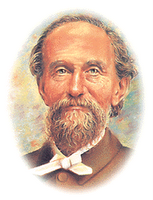Meditation: Christ-Centeredness of Everything!
 Great encouragement to focus, meditate, on the Christ-centeredness of everything. Not some things, but everything!
Great encouragement to focus, meditate, on the Christ-centeredness of everything. Not some things, but everything!Christ is not only the hero and central figure of the sacred scriptures, both Old and New Testaments: he is also the very sum and substance of all history and reality. Which is an assertion that demands a little more clarification and substantiation, as follows:
1. Christ is the sum and substance of all history
History is neither a random process of chance occurrences (as the modern secularist would hold), nor a series of Divine responses to exigencies created by man’s free will (as the Arminian believes). On the contrary, it was planned out exactly and minutely before time began. God is a God who ever “works all things after the counsel of his own will” (Ephesians 1:11); moreover, he is a God unto whom were already “known all his works from the beginning of the world” (Acts 15:18). Which is just to say that, from the beginning of the world, God knew his every work, and had laid out his minutely designed plan; and then he sovereignly and unerringly worked it all out to perfection.
And what was the heart and essence of this eternal and immutable will of God? In a word, the sacrifice and triumph of the spotless Lamb of God, Jesus Christ. He was not just slain in time; he was, in the divine decree, “slain before the foundation of the world” (Revelation 13:8). Then, “in the fullness of times” (Galatians 4:4), the rulers of this earth were gathered together to do nothing but what God’s hand and God’s counsel “determined before to be done” (Acts 4:27-28); which is just that Christ should be crucified, as God had planned from the beginning. The crucifixion of Christ, then, was in the eternal decree of God the very pinnacle and crowning moment of all history; and, in fact, that for which history was designed.
This plan was not only fore-determined by God the Father; but its accomplishment was also solemnly undertaken by the Son, in an inter-triune covenant, made before all creation. For it was then that the Father said to Christ our Savior, “ask of me, and I shall give you the nations for your inheritance, and the uttermost parts of the earth for your possession” (Psalm 2:8). And, in keeping with the eternal covenant, Christ came down in history, and accomplished all that the Father had designed; in accordance with which, just before his final, perfect self-sacrifice, he prayed to the Father, “I have glorified you on the earth: I have finished the work which you gave me to do. And now, O Father, glorify me with your own self with the glory which I had with you before the world was. I have manifested your name unto the men which you gave me out of the world: they were yours, and you gave them to me; and they have kept your word” (John 17:4-6).
So then, the cross of Christ was the pinnacle of the ages, that for which all of history was planned, and for the accomplishment of which, Christ entered into an eternal covenant with the Father. This climactic achievement of the world was accomplished in human time, when Christ came down to live a perfect life, and offer himself up as a substitutionary sacrifice for those whom the Father had covenanted to give to him, in exchange for his marvelous work of grace. In this actual event, which was confirmed, finalized, and crowned by his victorious resurrection from the dead and his ascension to the right hand of the Father, Christ fulfilled the Father’s perfect law (Hebrews 5:8-9); redeemed those for whom he came (Galatians 4:4-5); triumphed over the Serpent (Colossians 2:15; Romans 16:20), in accordance with the first prophetic promise of grace given to fallen mankind (Genesis 3:15); and finally conquered every evil effect of the curse, even its most hideous and universal offspring, Death (I Corinthians 15:25-26). And what was the ultimate purpose of this history-climaxing event, with its monumental and victorious results? It was so that Christ might be worshiped by every tongue, that every knee might bow to him (Philippians 2:5-11), that he might lead his children in victory (Ephesians 4:8), and rule over his enemies with a rod of iron (Psalm 2:9). In sum, it was so that, “in the dispensation of the fulness of times he might gather together in one all things in Christ, both which are in heaven, and which are on earth” (Ephesians 1:10); and so that, “in all things he might have the preeminence…in him should all fulness dwell” (Colossians 1:18-19). In conclusion, there is no person, event, or activity in all of history, however insignificant, that does not find its true meaning and purpose only in relationship to Christ’s great work on the cross.
2. Christ is the sum and substance of all reality
Not only is Christ the sum and substance of all history, as we have certainly demonstrated; more than that, he is the sum and substance of all reality. For first of all, it was only through Christ that anything was created in the first place (John 1:1-3); and then, it is only by Christ, that all things continue to have subsistence, to stay in existence from moment to moment (Colossians 1:17). Not only this, but all things were made for his pleasure and his glory (Revelation 4:11, Isaiah 43:7); and all things were made to be put under his feet (Ephesians 1:22-23), to be governed by his rod (Psalm 2:9). But we have already touched on that, and so we move on to our final point, that
3. The new creation, redeemed by Christ, will be the culmination of history and the perfection of reality
It would be a myopic and self-centered point of view to see the effects of Christ’s great redemptive work extended only to us, when the very greatness of the Redeemer demands that they be universal and infinite. And that is indeed the scriptural witness, which sees Christ’s redemptive work extended to all creation, utterly overturning every evil effect of sin and the fall, trampling on that old Deceiver, the Serpent, and turning all of this curse-bearing creation into a joyously good and fruitful world once again. This is what creation itself is groaning for (Romans 8:19-22); and this is where creation is certainly headed. That blessed prophet Isaiah sees the mighty effects of Christ, the suffering servant of Israel, swelling and growing up until the entire earth is newly created again in perfection and fruitfulness (Isaiah 65:17-25). And so, not merely the redemption of mankind, but the redemption of all creation, is the final result of Christ’s glorious accomplishment. The goal of history is wrapped up in the universal glorification of Christ, for his climactic work on the cross.
This new creation will be truly perfect. It will be everything that paradise was originally, and more: for Christ, our second Adam, regained far more than what our first Adam lost (Romans 5:16-21). In this new creation will be nothing associated with sin and its effects: there will be no sorrow, no tears, no sickness, no death, no curse, no darkness – but only ever-increasing worship, joyful adoration, and unending service to the One in whom the very purpose of history resides, Christ the triumphant Lamb (Revelation 21:1-5)!
So then, we have noted that Christ is the sum and substance of history; and the new creation will be the final, flawless consummation of history. Christ is the sum and substance of all reality; and the new creation will be the very perfection of universal reality. The new creation, then, is the final display of the victory and majesty and glory of our great God and Redeemer, Jesus Christ! Let us meditate long upon this blessed consummation, the likes of which “eye has not seen, nor ear heard” (I Corinthians 2:9). For as we look upon these unseen things, which do testify and proclaim to us Christ, whom, “having not seen, we love” (I Peter 1:8), only then will our inner man be renewed day by day (I Corinthians 4:16-18), until we find ourselves perfectly redeemed, to the glory of our Savior, in our final resting place, the heavenly kingdom of Christ.
(HT: Nathan Pitchford, Reformation Theology)







